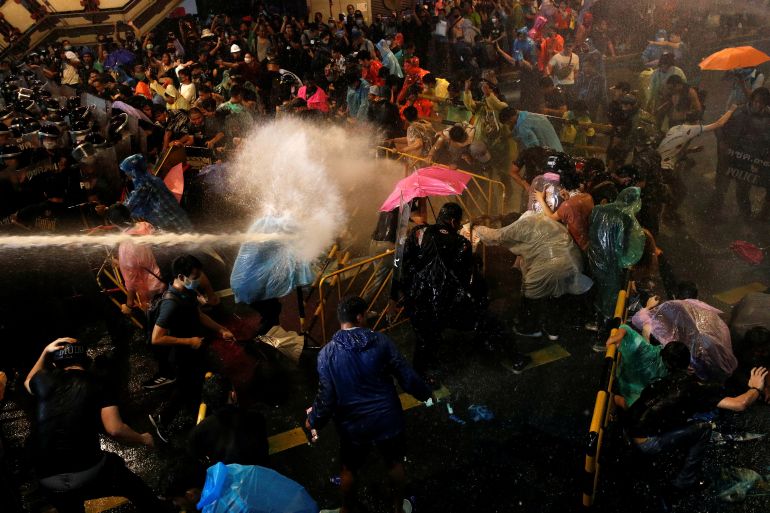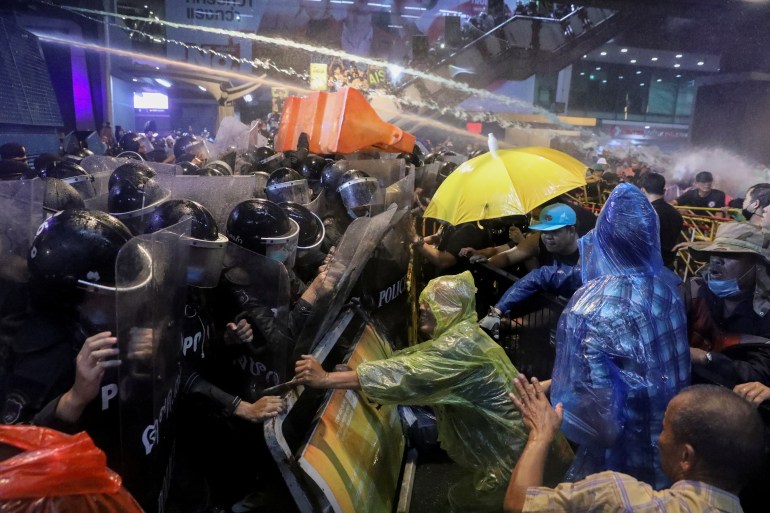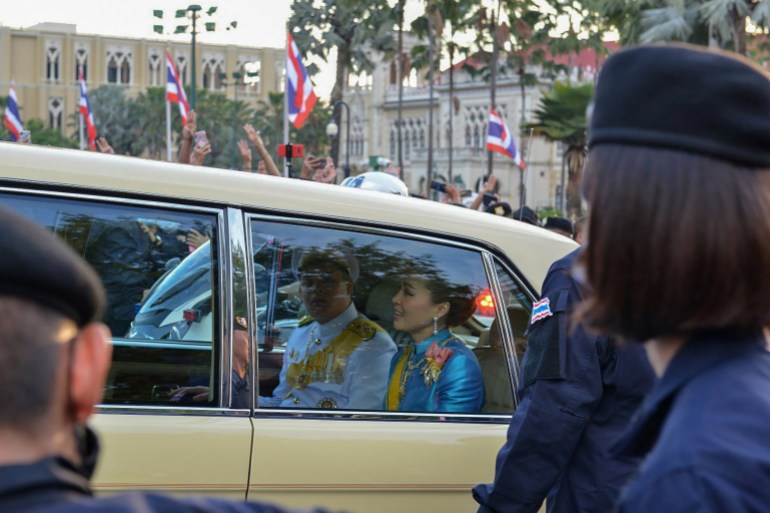Thai police fire water cannon at Bangkok protesters
About 3,000 pro-democracy demonstrators defy state of emergency to call for prime minister’s resignation and monarchy reform.

Thai police fired water cannon against protesters on Friday in central Bangkok as the pro-democracy activists defied an emergency decree banning gatherings for a second night running.
About 3,000 pro-democracy demonstrators in the city’s main shopping mall district had been chanting for the release of arrested activists and hurled obscenities at Prime Minister Prayut Chan-o-Cha.
Keep reading
list of 3 itemsWhy are Thai students protesting against King Vajiralongkorn?
‘Evil conduct’: Thai king fires four more palace officials
Several hundred riot police advanced towards them in formation, calling on the protesters to go home. Police fired chemical-laced water from the cannon, pushing back the demonstrators who used umbrellas against the blue liquid.
A few metres away, hundreds of activists blocked the road behind a makeshift barrier calling for the riot police to “get out!” and singing the Thai national anthem. Four police officers and one protester were injured, according to a city hospital.
“The younger generation will not stand for the status quo any longer,” said design student Pim, 20, as protesters raised their arms to display a three-fingered salute adopted from the Hunger Games movies. “The poor are becoming poorer and the rich are becoming richer. The gap is growing.”
Police later dispersed the protesters, but many vowed to return to the streets.
“The [use of force] will increase the numbers of protesters,” said 21-year-old Nine, an engineering student. “Anger has built up inside.”
The kingdom’s political elite has been jolted by the youth-led movement that is demanding the government’s resignation while issuing a once-taboo call for reforms to Thailand’s powerful monarchy.

‘I’m not quitting’
Prime Minister Prayuth said on Friday he would not resign as anti-government protesters promised to continue their rallies despite a ban on demonstrations under new emergency measures.
Prayuth held an emergency cabinet meeting on Friday morning after tens of thousands of people thronged central Bangkok on Thursday night even after the ban on protests.
The prime minister said the government would not hesitate to use its new powers.
“I’m not quitting,” he said. “The government must use the emergency decree. We have to proceed because the situation became violent … It is being used for 30 days, or less if the situation eases.”
The student-led demonstrations began in July directed at not only Prayuth, leader of the 2014 military coup, but King Maha Vajiralongkorn, in the biggest challenge for years to an establishment long dominated by the army and palace.
King Vajiralongkorn said “the country needs people who love the country and love the monarchy” in pre-recorded comments broadcast on state television on Friday from an event a day earlier. The king has made no direct comment on three months of protests that have called for curbs to his powers.

Thailand’s modern political history is dotted with periods of violent civil unrest and more than a dozen military coups.
Bangkok-based analyst Thitinan Pongsudhirak said the protest movement could heighten the chances of Thailand facing yet another military takeover.
“This endgame for Thailand’s future has been building up for years, and it is finally here and now,” he said. “A brutal dispersal of the protest may take place.”
The government imposed an emergency decree on Thursday, giving the authorities the power to arrest demonstrators without warrants, and also to seize “electronic communications equipment, data and weapons”. Online messages that “threaten national security” are also banned.
Despite the announcement, tens of thousands of Thais congregated among Bangkok’s shopping malls and luxury hotels on Thursday night to continue their fight for reform.
Prayuth said the emergency declaration was necessary because of “violence” and an “unprecedented incident” during the rallies earlier this week.
Charges over motorcade
On Wednesday, videos shared widely on social media showed Queen Suthida and Prince Dipangkorn Rasmijoti sitting inside the yellow car as it inched its way – surrounded by police – through crowds of people holding their arms aloft in the three-finger salute and shouting their demands.

Police said on Friday two men would be charged with attempted violence against the queen as a result of the incident.
Section 110 of the Thai criminal code carries a sentence of 16 years to life imprisonment for anyone found guilty of violence or attempted violence against the queen, heir apparent or regent, with a death sentence if the act is likely to endanger their life.
There was no indication in the videos of the queen being harmed, and she later went on to perform her palace duties at a temple.
Ekachai Hongkangwan and Bunkueanun Paothong were among activists who crowded around the royal motorcade. In a Facebook broadcast on Friday, Bunkueanun denied trying to harm the queen, insisting: “I am innocent. That was not my intention.”
It is not clear why the pair were singled out. It was the first time such a serious charge has been levelled against pro-democracy activists, many of whom have already been hit with lesser charges, including sedition and breaking coronavirus rules on gatherings.